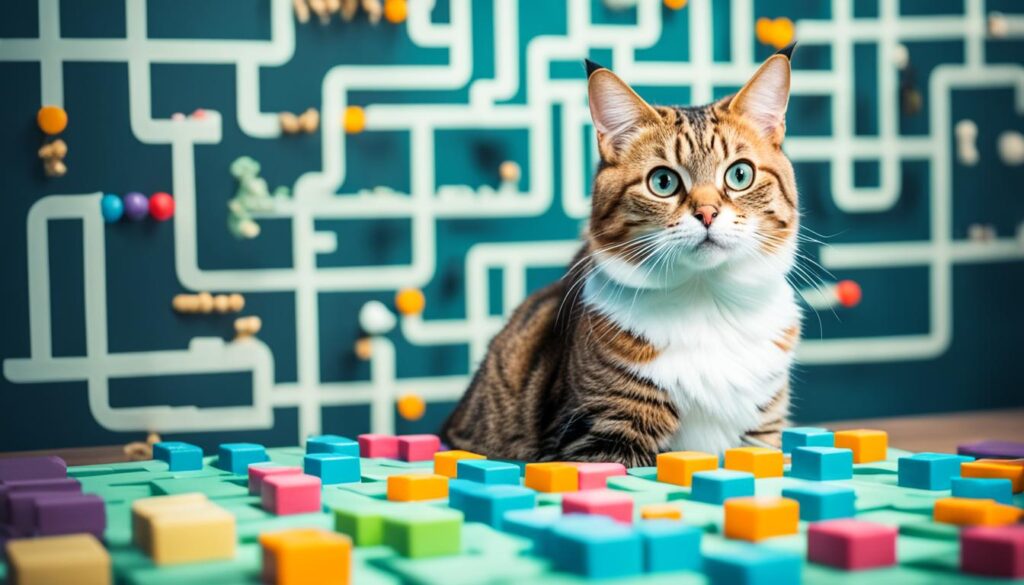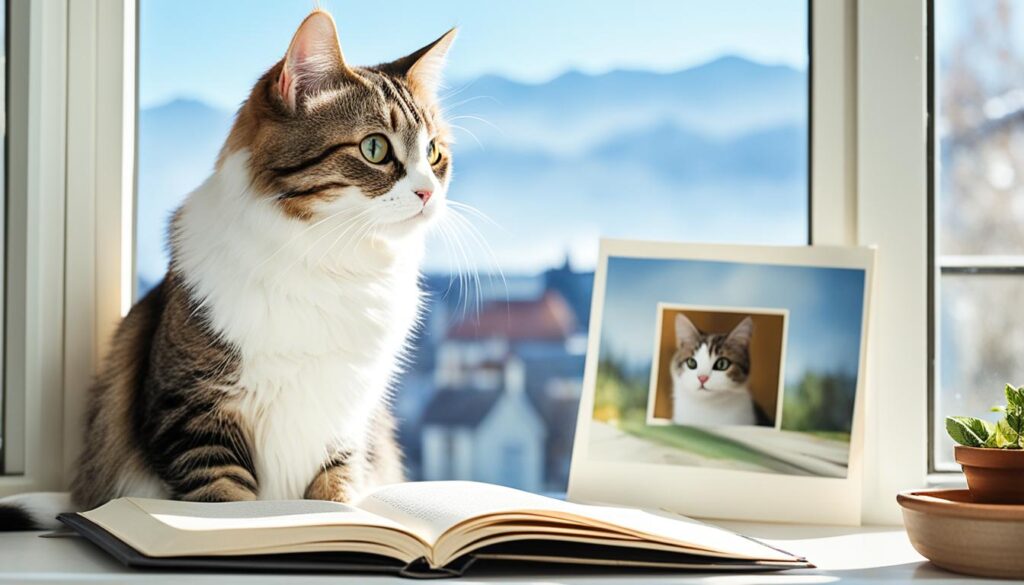Did you know that cats possess memory capabilities similar to humans? It’s true! Despite their reputation for being independent and aloof, cats have the ability to store and recall information and experiences. So, just how well do cats remember? Let’s delve into their cognitive skills and explore the fascinating realm of feline memory.
Key Takeaways:
- Cats have remarkable memory abilities, including both short-term and long-term memory.
- They can remember things like the location of their food bowl and recognize familiar faces.
- Cats remember events as a series of sensory inputs rather than a complete story.
- Their memory is closely linked to their instincts, allowing them to remember the scent of their prey and the location of food sources.
- Understanding and supporting cats’ memory capabilities can enhance their well-being and strengthen the bond between humans and cats.
Types of Memory in Cats
Cats possess different types of memory that contribute to their cognitive abilities. Understanding these memory mechanisms helps us comprehend how cats perceive and interact with their environment.
Short-Term Memory
Cats have a remarkable short-term memory which allows them to retain information for a few minutes to a few hours. They can remember where they hid their toys or the location of their food bowl. This type of memory helps cats navigate their immediate surroundings and carry out routine tasks.
Long-Term Memory
Cats also possess long-term memory, enabling them to remember things over an extended period. They can recall important information, such as their owners’ identities, even after long periods of separation. Long-term memory in cats can last from a few days to several years, evidencing their capability to retain significant experiences and associations.
Sensory Memory
Sensory memory is another essential aspect of cats’ memory capabilities. This type of memory allows them to retain information obtained through their senses, such as taste, touch, and smell. Cats rely on sensory memory to recognize familiar scents, distinguish between different textures, and detect changes in their environment.
Understanding the various types of memory in cats helps us appreciate their cognitive abilities and contributes to providing them with a stimulating and enriched environment.
| Type of Memory | Duration | Examples |
|---|---|---|
| Short-Term Memory | A few minutes to a few hours | Remembering the location of toys, food bowl |
| Long-Term Memory | From days to years | Recognizing owners even after long separations |
| Sensory Memory | Varies based on sensory inputs | Retaining information obtained through taste, touch, and smell |
The table above summarizes the different types of memory in cats, their duration, and examples of their practical applications.
How Cats’ Memory Differs from Humans
Cats’ memory capabilities differ significantly from those of humans. While humans possess episodic memory, which allows them to recall specific events and the context surrounding them, cats do not possess this type of memory. Instead, cats remember events as a series of sensory inputs rather than a complete story.
Cats’ memory is closely linked to their instincts and their ability to remember the scent of their prey and the location of food sources. This sensory memory plays a vital role in their survival, helping them navigate their environment and find necessary resources.
Unlike humans, who can recall the details and narrative of past experiences, cats rely on their sensory memory to guide their actions. They remember the essential sensory cues from their surroundings, such as the sound of prey, the scent of familiar objects, and visual landmarks.
This type of memory system enables cats to adapt and thrive in their natural habitats, as they can quickly recognize potential threats, locate food sources, and remember the layout of their territory.
It’s important to understand and appreciate the unique way in which cats remember information. By acknowledging their reliance on sensory memory, we can better understand their behaviors and provide them with an environment that supports their natural instincts.
Comparing Cats’ Memory to Human Episodic Memory
- Episodic memory in humans allows for the recall of specific events and the context surrounding them.
- Cats remember events as a series of sensory inputs, focusing on essential cues rather than the complete narrative.
- Humans can recall memories in a detailed and chronological sequence, whereas cats remember individual sensory information without the same level of extension.
- Humans often attach emotions and personal experiences to their memories, but cats rely more on sensory information for survival.
Factors Affecting Cats’ Memory
Several factors can impact cats’ memory retention and recall. Understanding these factors is essential for ensuring the cognitive well-being of our feline companions.
Age and Memory Retention in Cats
As cats age, their memory may naturally decline. Senior cats may experience memory loss, making it challenging for them to remember things such as the location of their food bowl or the layout of their surroundings.
Environmental Factors and Cats’ Memory
The environment in which a cat lives can significantly affect their memory. A stressful environment can hinder memory recall, as stress hormones can impact brain function. Conversely, an enriched environment with opportunities for mental stimulation can enhance cats’ memory and cognitive abilities. Interactive toys, scratching posts, and dedicated playtime can all contribute to a stimulating environment for your cat.
Health and Memory in Cats
Cats’ physical health can also impact their memory. Illnesses such as dementia or brain dysfunction can affect their ability to remember things. Regular veterinary check-ups and monitoring your cat’s overall health can help identify and address any underlying health issues that may impact their memory.
To improve cats’ memory and overall cognitive function, several strategies can be implemented:
- Providing a Consistent Routine: Cats thrive on routine and structure. Consistency in their daily activities, such as feeding times and play sessions, can help reinforce memory and create positive associations.
- Mental Stimulation: Engaging your cat in mental exercises and interactive play can keep their brain active. Puzzle toys, treat-dispensing toys, and clicker training can all provide mental stimulation and encourage memory recall.
- Healthy Diet: Providing a balanced and nutritious diet is crucial for maintaining overall brain health. Essential nutrients, such as omega-3 fatty acids and antioxidants, can support cognitive function and memory retention in cats.
By understanding and addressing these factors, we can improve cats’ memory abilities and contribute to their overall cognitive well-being.
Signs Your Cat Remembers You
There are several signs that indicate your cat remembers you. Cats have a strong sense of smell and can recognize your scent, often sniffing you or your belongings when you come home. They can also respond to your voice, distinguishing it from a stranger’s voice. Familiar behaviors and routines, such as greeting you at the door or exhibiting specific behaviors in your presence, can also indicate that your cat remembers you.
One of the signs that your cat remembers you is their ability to recognize your scent. Cats have an incredibly powerful sense of smell, and they can pick up on the unique scent of their favorite humans. When you come home, you may notice that your cat sniffs you or rubs against your legs, marking you with their own scent as a way of showing affection and ownership. This recognition of your scent is a clear sign that your cat remembers you and has a strong bond with you.
Another sign that indicates your cat remembers you is their response to your voice. Cats have excellent hearing and can distinguish between different voices and tones. When you speak to your cat, they may tilt their head, perk up their ears, or respond with meows and purrs. This recognition of your voice is a clear indication that your cat remembers you and associates your voice with positive experiences and interactions.
Familiar behaviors and routines are also strong indicators that your cat remembers you. Cats thrive on routine and feel secure when their environment is predictable. If your cat greets you at the door when you come home, follows you around the house, or exhibits specific behaviors and postures when you are present, it is a strong indication that they remember you and feel comfortable in your presence.
Strengthening the bond between you and your cat can further enhance their memory of you. Take the time to engage in scent-based interactions, such as gently petting your cat and allowing them to rub their scent against you. Additionally, regular vocal interactions, such as talking to your cat, using their name, and providing positive reinforcement, can help further solidify their memory of you. By nurturing these connections, you can deepen the bond with your feline companion.
How to Improve Your Cat’s Memory
If you want to enhance your cat’s memory, there are several effective strategies you can implement. By providing mental stimulation and enrichment, maintaining consistency in training and interaction, and ensuring a balanced diet, you can optimize your cat’s memory retention and overall cognitive function.
Mental Stimulation and Enrichment
One of the key ways to improve your cat’s memory is to provide mental stimulation and enrichment opportunities. Interactive toys, such as puzzle feeders or treat dispensers, engage your cat’s cognitive skills and encourage problem-solving. Regular playtime sessions, incorporating activities like hide-and-seek or laser pointer games, can also keep their brain active and boost memory function. Remember to rotate toys and play different games to keep the experience fresh and exciting for your feline companion.
Consistency in Training and Interaction
Consistency is essential when training and interacting with your cat to improve their memory. Reinforce positive behaviors through rewards, such as treats or praise, and establish clear cues and commands. Repetition and consistency help reinforce memory recall and improve your cat’s understanding of desired behaviors. Regular interaction, including grooming sessions, petting, and gentle handling, also fosters positive associations with you and strengthens the bond between you and your cat.
Diet and Nutrition for Optimal Memory
A balanced diet plays a vital role in supporting optimal brain health and memory retention in cats. Ensure your cat’s diet includes essential nutrients like omega-3 fatty acids and antioxidants. Omega-3 fatty acids, typically found in fish-based diets or as supplements, promote brain function and memory. Antioxidants, obtained from fruits and vegetables, help reduce oxidative stress and support overall cognitive function. Consult with your veterinarian to determine the best diet and nutritional plan for your cat’s specific needs.
Consistent Routine and Enriched Environment
Maintaining a consistent routine and providing an enriched environment can further enhance your cat’s memory and overall well-being. Cats thrive on predictability, so establish a regular schedule for feeding, playtime, and rest. This routine helps them form associations and memories related to specific activities. Additionally, create an enriched environment by offering scratching posts, climbing structures, and window perches. Providing sensory experiences, like bird feeders outside the window or a variety of toys, stimulates your cat’s senses and keeps their memory engaged.
By implementing these strategies, you can actively improve your cat’s memory and promote their overall cognitive function. Remember to personalize these activities based on your cat’s preferences and consult with a veterinarian for personalized recommendations.
Exploring Feline Memory Research

Researchers have conducted numerous studies to delve into the fascinating world of feline memory. These recent investigations have provided valuable insights into the memory capabilities of our feline friends. Through various experiments, scientists have discovered that cats possess remarkable memory skills.
One key finding from these studies is that cats can retrieve and utilize incidentally encoded information from past experiences. They have the ability to remember both the “where” and “what” aspects of a single event, highlighting their impressive recall and utilization of memory.
To further understand the extent of cats’ memory abilities, these studies have compared feline memory to that of other animals. The research consistently demonstrates that cats possess exceptional memory capabilities, showcasing their unique cognitive abilities.
| Cats’ Memory Research | |
|---|---|
| Key Finding | Cats can retrieve and utilize incidentally encoded information from past experiences. |
| Memory Comparison | Cats’ memory abilities are comparable to those of other animals. |
The Importance of Memory for Cats’ Well-being
Memory plays a crucial role in the well-being and survival of cats. The ability to remember and recall information allows cats to navigate their environment, find food sources, recognize familiar faces and places, and avoid potential dangers. Memory also influences cats’ behavior and responses to various stimuli they encounter. A well-functioning memory helps cats feel secure, confident, and in control of their surroundings, ultimately contributing to their overall well-being.
Cats rely on their memory to establish a sense of familiarity and comfort in their environment. By remembering the layout of their territory, cats can confidently explore and navigate their surroundings without feeling threatened or anxious. Memory also enables cats to recognize their owners and primary caregivers, forging a bond built on trust and familiarity.
Furthermore, memory is essential for cats’ survival in the natural world. By remembering the location of reliable food sources and potential hunting grounds, cats can ensure their nutritional needs are met. Additionally, a well-developed memory allows cats to recall previous encounters with predators or dangerous situations, enabling them to avoid potential harm.
Supporting and understanding the memory capabilities of cats is crucial for their well-being. By providing a stimulating and enriching environment, you can help keep their memory sharp. Interactive toys, puzzles, and playtime can all contribute to mental stimulation and help exercise their memory. Consistency in training and interaction can also reinforce memory recall, reinforcing positive behaviors and associations.
Proper nutrition is another critical factor in maintaining cats’ memory health. Ensuring they receive a well-balanced diet that includes essential nutrients, vitamins, and antioxidants can support optimal brain function and memory retention. Regular veterinary check-ups can also help identify any potential health issues that may impact memory and overall cognitive function.
In conclusion, memory plays a vital role in the well-being and survival of cats. By understanding and supporting their memory capabilities, we can provide an environment that promotes their overall well-being and quality of life.
| Benefits of Memory for Cats’ Well-being | Ways to Support Cats’ Memory |
|---|---|
|
|
The Role of Memory in the Human-Cat Bond

Memory plays a significant role in the human-cat bond. Cats have the remarkable ability to remember their owners and the shared experiences they have had together. Whether it’s playtime, feeding, or moments of affection, these memories contribute to a deep emotional connection between humans and cats.
When cats recall these memories, they often associate them with positive emotions, strengthening the bond and creating a sense of familiarity, trust, and companionship. The ability to remember these shared experiences allows cats to feel a sense of security and attachment to their human companions.
For humans, memory also plays a vital role in fostering a meaningful bond with their feline friends. The memories we create with our cats form the foundation of our relationship. From the earliest moments we bring them home, to the everyday experiences we share, these memories help us build a strong and lasting connection.
By nurturing positive memories and experiences, we can enhance the human-cat bond. Engaging in activities that create lasting impressions, such as interactive play sessions, grooming, and providing a loving and consistent environment, can help strengthen the emotional connection between humans and cats.
Shared Memories and Emotional Connection
Shared memories with our cats not only evoke positive emotions but also deepen our understanding of each other. Cats can remember the affection and care they receive from their owners, leading to a more profound sense of trust and intimacy.
These memories are not just limited to specific moments. Cats have the ability to remember patterns and routines in their daily lives. They can anticipate their owner’s actions and respond accordingly, reinforcing the emotional connection between humans and cats.
Furthermore, the emotional bond between humans and cats is often reciprocal. The memories we create with our feline companions evoke feelings of joy, comfort, and love. These positive emotions enhance our own well-being and contribute to the overall quality of the human-cat bond.
The Impact of Memory on the Human-Cat Bond
| Benefits of Memory in the Human-Cat Bond | How Memory Strengthens the Bond |
|---|---|
| Enhanced sense of familiarity and trust | Cats recognize their owners through memory recall, creating a sense of trust and comfort. |
| Deeper emotional connection | Shared positive memories evoke strong emotions, deepening the bond between humans and cats. |
| Reciprocal relationship | The emotional bond is strengthened as humans and cats create and remember positive experiences together. |
| Improved well-being | Memories of joyful moments with cats contribute to humans’ overall happiness and satisfaction. |
The table above highlights the various benefits of memory in the human-cat bond. It demonstrates how memory strengthens the bond by fostering familiarity, trust, and emotional connection, ultimately resulting in improved well-being for both humans and cats.
By acknowledging the significance of memory in our interactions with cats and actively nurturing positive memories, we can enhance the human-cat bond, creating a lifelong and rewarding relationship.
Conclusion
Cats possess impressive memory capabilities, with the ability to remember both short-term and long-term information. They can remember the location of their food bowl, recognize their owners, and recall past experiences. Memory plays a vital role in cats’ well-being and survival, allowing them to navigate their environment and respond to stimuli.
Understanding and supporting cats’ memory capabilities is essential for enhancing their quality of life. By providing mental stimulation, consistency in training and interaction, and a balanced diet, we can optimize their memory function and overall cognitive health.
Furthermore, memory also strengthens the bond between humans and cats. Positive experiences and shared memories create a sense of familiarity, trust, and companionship. By fostering a loving and nurturing environment, we can deepen the human-cat bond and ensure a long-lasting relationship based on mutual understanding and emotional connection.
In conclusion, cats have a remarkable memory, and its importance cannot be overstated. From their day-to-day activities to their relationship with humans, memory plays a vital role in every aspect of a cat’s life. By recognizing and supporting their memory capabilities, we can provide them with the best possible care and strengthen the special bond we share with our feline companions.
FAQ
Do cats have a good memory?
What types of memory do cats have?
How does cats’ memory differ from humans?
What factors can affect cats’ memory?
What are the signs that your cat remembers you?
How can you improve your cat’s memory?
What does feline memory research reveal?
What is the importance of memory for cats’ well-being?
How does memory impact the human-cat bond?
What is the conclusion about cats’ memory capabilities?
References
| International Cat Association (TICA) | https://www.tica.org/ |
| The Cat Fanciers’ Association (CFA) | https://cfa.org/ |
| World Cat Federation (WCF) | https://www.wcf-online.de/ |
| Fédération Internationale Féline (FIFe) | https://www.fifeweb.org/ |








[…] we’ll explore how you can manage your cat’s nighttime activity to promote better sleep for both of […]
[…] back to our exploration of the fascinating Sphynx cat breed! In this section, let’s take a closer look at the origins of this exotic and unique cat […]